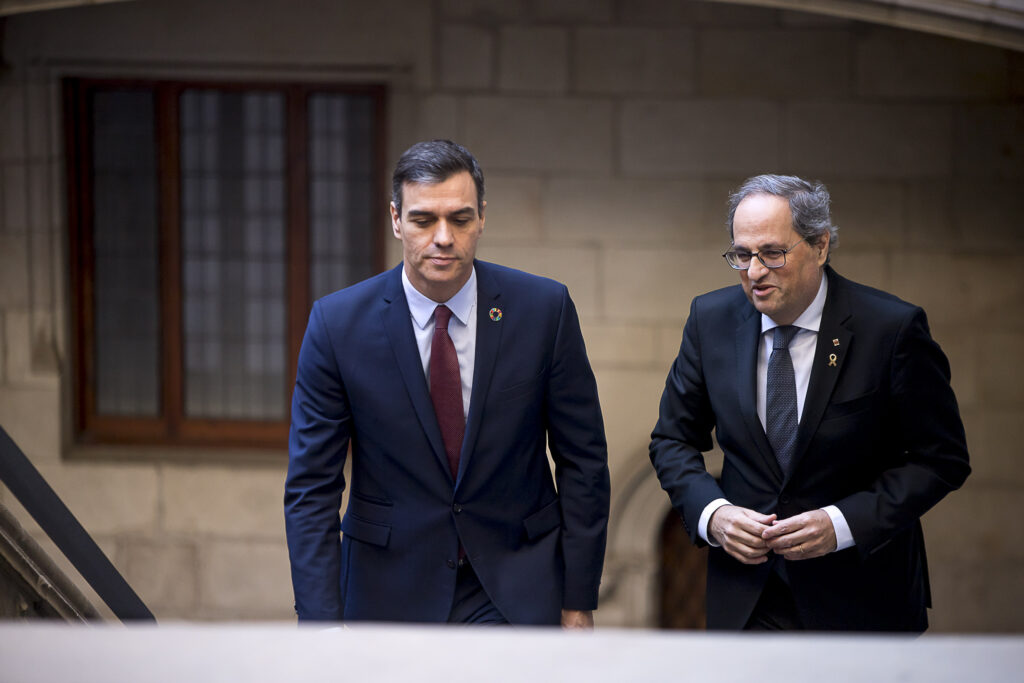06.02.2020 - 15:54
|
Actualització: 06.02.2020 - 16:54
The Catalan and Spanish governments will start a dialogue as soon as this February. This is the main outcome of the meeting between the Spanish president, Pedro Sánchez, and the Catalan leader, Quim Torra, who met on Thursday in person for the first time in over a year. Both leaders agreed that the first summit between cabinets in February will be chaired by the heads of government.
Sánchez and Torra expressed openness to engage in dialogue during their press conferences after their talk – however, they made clear that their positions are very distant on self-determination for Catalonia and an amnesty for the pro-independence jailed leaders. The opposing stances remain the same. Both leaders met for an hour and a half on Thursday in the Catalan government headquarters, located in Barcelona.
It was the first time in over a year that Sánchez and Torra have met in person, after talks failed in early 2019 when Catalonia proposed a mediator to oversee the negotiations.
Torra: ‘We don’t know Spanish government’s proposal”
President Torra welcomed the readiness of Sánchez to engage in dialogue, and said the Catalan government’s proposal to find a way out of the independence crisis is clear: self-determination and “end of repression,” including an amnesty for the jailed leaders. Yet, he cast doubt on Madrid’s idea of resolving the conflict: “We don’t know what the Spanish government’s proposal is.”
The Catalan leader also talked about the root causes of the independence issue, and the traditional goals of the Catalan feeling, including “bilateralism” and “being recognized as a political actor,” he said. For Torra, the main outcome of the meeting was “the mandate to specify solutions.”
Sánchez: “Agenda for rekindling ties”
Sánchez put forward that a “bilateral committee” including ministers meet before March, as part of a four-page document he handed Torra called ‘Agenda for rekindling ties.’ Thus the document aims to begin the “bilateral negotiation table,” which was agreed between the Socialists and Esquerra in exchange for keeping Pedro Sánchez in power, this month. The document mentions the need to find a way out of the independence crisis through “solutions within the legal framework and with legal security.”
According to Sánchez, the paper responds “constructively” to 44 demands put forward by the three most recent Catalan presidents, suggesting that the negotiation table should revolve around six points: political dialogue and institutional regeneration, regional funding, improvement of cooperation among administrations, social policies, support to infrastructures, and backing in natural disasters.
First time in a decade
The Catalan and the Spanish prime ministers began their first meeting in person in over a year on Thursday at 12pm sharp. Quim Torra and Pedro Sánchez shook hands outside the Catalan government HQ in Barcelona before going in, doing a quick tour through the building and starting their talk. It is the first time in over a decade that a Spanish president has set foot in the Palau de la Generalitat – the last one who did so was José Luis Rodríguez Zapatero, also a Socialist.
One month after new cabinets in both Barcelona and Madrid were installed, their presidents met for a first official meeting in Madrid on July 9, 2018. And while the Spanish government described the encounter as “courteous” and “cordial,” it also bluntly ruled out Torra’s key demand for a binding referendum on self-determination.
Little progress was achieved in the following months. Yet, a second meeting was held on December 20, 2018, and the result was encouraging for the talks. They issued a joint statementcommitting to dialogue in order to find a way out of the independence crisis for the first time. “Even though [the governments] have notable differences on the origin, nature and way of solving [the conflict], they share, above all, their backing for effective dialogue that creates a political proposal that has the support of the Catalan society,” it read.
Some further steps were taken in the following weeks, and the two cabinets reached an agreement to introduce a mediator in the talks in February 2019. Yet, this infuriated Spain’s right-wing parties and part of the Socialists, leading to the Spanish government to make a U-turn, reject the mediator and call a snap election after the pro-independence parties rejected to support it anymore in response.
The election in Spain in April 2019 led to a further election in November as the congress was deadlocked for most of 2019, and Sánchez could not regain full power until January 2020. Pro-independence Esquerra’s support is still essential for Sánchez to have the numbers to govern.


